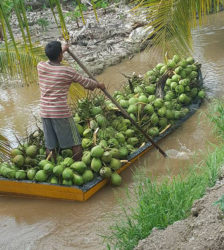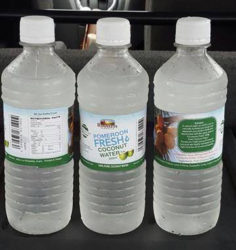Even as the role of coconut continues to grow in significance, the recent revelation that regional supplies of the fruit may be dwindling to the detriment of the continually expanding demand for its by-products is one that must be taken seriously, Raymond Trotz, Chairman of the National Coconut Stakeholders Platform told Stabroek Business.

Last week, Trotz told this newspaper that consultations among local, regional and international participants at next month’s Coconut Festival due to be held here is likely to lend attention to a recent report published by the Manhattan-based media group Bloomberg that the Caribbean may be on the threshold of a major coconut shortage that could seriously affect supplies of its water, oil and other by-products on the US market.
In a telephone interview with Stabroek Business earlier this week Trotz, proprietor of the coconut water brand, Phoenix, said that while he was personally still to verify the claims of an impending regional coconut shortage made in the Bloomberg report, he was “not surprised” by the report.
The report, however, could heighten interest in the October Coconut Festival where, according to Trotz, issues relating to the longer-term future of the region’s coconut industry, including its significance for both the regional manufacturing sector and the export market are likely to arise.
While the coconut shortage report is based on claims of sustained inclement weather including regional storms and droughts and insect-borne fruit diseases, Trotz told Stabroek Business that in the particular case of Guyana the sector has had to deal with an increasing demand for coconuts in the face of ageing coconut groves and a consequential reduction in coconut production.


The Bloomberg Report says that since 1994, coconut plantations have already shrunk up to 17%, quoting a coordinator of a Trinidad research programme as saying that “at this pace, the Caribbean is running out of coconuts.” In the particular case of Guyana, Trotz has conceded to the Stabroek Business that the hunt is on in coconut-growing regions of the country in an effort to narrow the gap between supply and demand.
According to Trotz supply problems in the local coconut industry have already led to the shutdown of one coconut oil factory last year. More than that export demand on the local coconut industry continues to grow steadily mainly because of growing regional markets in the Dominican Republic and Trinidad and Tobago.
Coconut exports to the twin-island CARICOM member state are linked mainly to the continually mounting demand for coconut water while the success of the coconut-related manufacturing sector in the Dominican Republic means that the country now secures 50 per cent of its coconut supplies from Guyana.
Much of the ‘hum’ in North America associated with coconut consumption is linked to the health-related endorsements which by-products like coconut water have secured from celebrities. The Bloomberg article makes reference to the consequential rising popularity of brands like Starbucks, Vita Coco, and Trader Joe’s in what it says has become “a nearly US$4 billion industry.” It says that since 2013 the price of coconut oil has gone up about 50%.
According to the Bloomberg article, coconut supply concerns go beyond the Caribbean to the big players in Asia as countries “like the Philippines and Indonesia are also struggling as they deal with the long-term consequences of natural disasters and demand that is outstripping the pace of coconut trees’ growth.”
Trotz says he is not unmindful of the coincidence between next month’s Coconut Festival and what appears to be a wider sector-related discourse on the future of the coconut industry. He believes that it may be just what is needed to generate both public and private sector interest in both the October event and the broader future of an industry where a window of opportunity may well be opening for Guyana.





